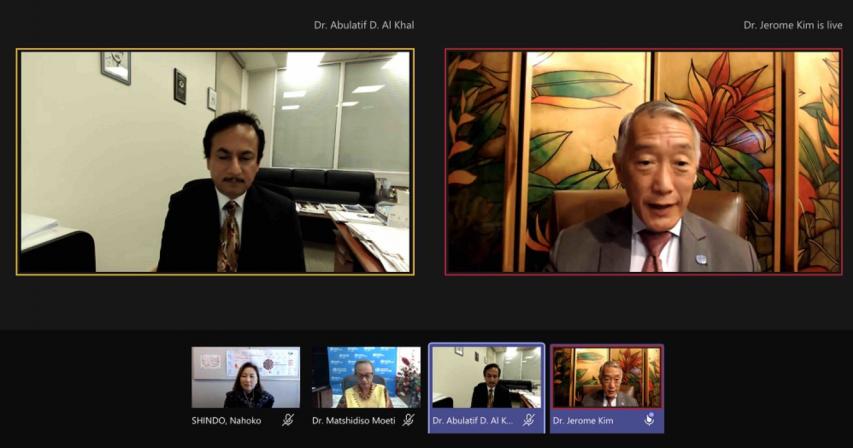Vaccination and taking responsibility is the way out of the pandemic, QF’s Education City Speaker Series hears
- 4 years ago

Online discussion in collaboration with WISH shares global perspectives on vaccines – and Qatar’s vaccination target
Returning to “normal” life amid the COVID-19 pandemic will only happen if every single person in the world makes it their responsibility, health experts have told a global online audience as Qatar Foundation’s Education City Speaker Series explored whether new vaccines can point the way to victory over the virus.
In a virtual discussion titled An Injection of Hope: Do Vaccines Mean an End to the Pandemic Is in Sight? – hosted in collaboration with the World Innovation Summit for Health, Qatar Foundation’s global healthcare initiative - World Health Organization (WHO) representatives and leaders of public health and vaccine science emphasized that all of global society must play an “active role” in defeating COVID-19 – not only by being vaccinated, but by continuing to follow health guidelines even after they have received a vaccine.
The session also saw speakers drive home the importance of vaccine equity, warning “nobody is safe until everyone is safe”; while Dr. Abdullatif Mohammed Al Khal, Chairman of Qatar’s National Pandemic Preparedness Committee and Deputy Chief Medical Officer at Hamad Medical Corporation, told the platform that Qatar aims to vaccinate at least 90 percent of its vaccine-eligible population by the end of the year.
“World leaders need to maintain strong political, social, and economic solidarity to scale up the global response and minimize the impact of the pandemic,” Dr. Ahmed Al Mandhari, WHO Regional Director for the Eastern Mediterranean. “Rich countries have the full capability to make sure their citizens are vaccinated, but we should not let those in low-resource countries go without vaccination.
“This pandemic is new to us. We haven’t experienced anything like it in 100 years. But the vaccine is a tool to protect us. It will lessen the severity of the virus, and it will save lives.”
“Fairer distribution and support from wealthy countries is vital to ensuring that low- and middle-income countries are not left behind in the vaccine drive. Research shows that ensuring equitable access will save up to $500 billion globally and afford protection to all economies. According to Dr. Al Khal, Qatar aims to vaccinate more than 100,000 people each week to meet its goal of vaccinating the majority of the population against COVID-19 by the end of the year, as he said: “One of the challenges is ramping up the vaccination program to reach this goal, and we have allocated the necessary resources to do that.”
“ Every member of every community in every country should feel that they have an active role in fighting COVID-19,” Dr. Abdullatif Mohammed Al Khal Among these challenges, he said, had been an “initial shortage of supply” with global production unable to keep up with demand. And even as the vaccine rollout intensifies, he stressed the need to recognize that the battle against COVID-19 is everyone’s battle.
“In order for us to control the pandemic and gradually start to go back toward normal life, every member of every community in every country should feel that they have an active role in fighting COVID-19, and that they have an individual responsibility they must fulfil by following restrictions and basic preventative measures,” he said.
Be kind, be smart, be responsible, and let’s have our future back in our hands,”
Nahoko Shindo said “Everyone should not hesitate to get the vaccine when their time comes, but should continue to follow the preventative measures even after getting the vaccine.”
The session – moderated by journalist, newsreader, and TV presenter Kirsty Wark – also heard from Nahoko Shindo, Head of Secretariat for WHO’s Strategic and Technical Advisory Group for Infectious Hazards, who called on global communities to “be kind, be smart, be responsible, and let’s have our future back in our hands.”
And she also explained how COVID-19 misinformation has led to about 800 people dying and almost 6,000 being hospitalized, saying: “We have to use social and behavioral science to tackle this infodemic – it’s not just a top-down message; we really need a bottom-up approach to control this virus, and that is why the right understanding of vaccines is so important.
“There’s an abundance of information – we call it an army of information – about the pandemic, which people have to choose from. And making that choice is really difficult.”
As we’re all in this together, we have to work together to vaccinate, wear masks, and physically distance ourselves until the pandemic is under substantial control
Dr. Jerome Kim:
Meanwhile, Dr. Jerome Kim, Director-General of the International Vaccine Institute, focused on the science behind the vaccine, telling the discussion: “There are still many questions that we have to answer about the correct dose and spacing of doses; whether a second wave of vaccines can be tested as quickly and easily; whether we understand how vaccines prevent infection or transmission, to get to the real question around vaccine effectiveness.
“We need an international network of surveillance and sequencing of viruses from all over the world so that, in real-time, organizations like WHO and others are able to identify variants that pose a threat to the success of vaccines and vaccination.
“And as we’re all in this together, we have to work together to vaccinate, wear masks, and physically distance ourselves until the pandemic is under substantial control.”
Source: Qatar Foundation
Comments